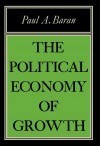
Paul Baran’s Economic Surplus Concept, the Baran Ratio, and the Decline of Feudalism
Recently published and estimated historical data illustrate that economic surplus declined during the thirteenth and fourteenth centuries in England, helping explain the “crisis of feudalism” that started in the thirteenth century. It was not until several centuries later, when capitalism became the dominant economic system, that the economic surplus began to rise on a consistent basis, due to the reinvestment of a portion of the surplus into productive activities, a greater ratio of capital income to rental income, and a greater ratio of investment to economic surplus. | more…